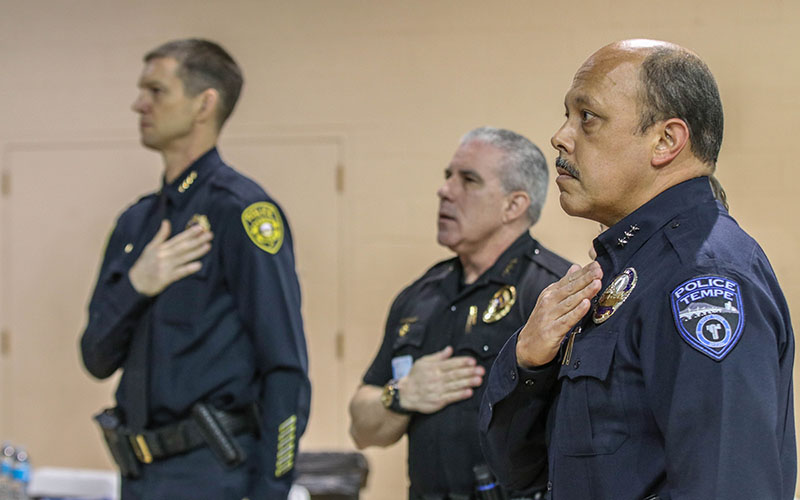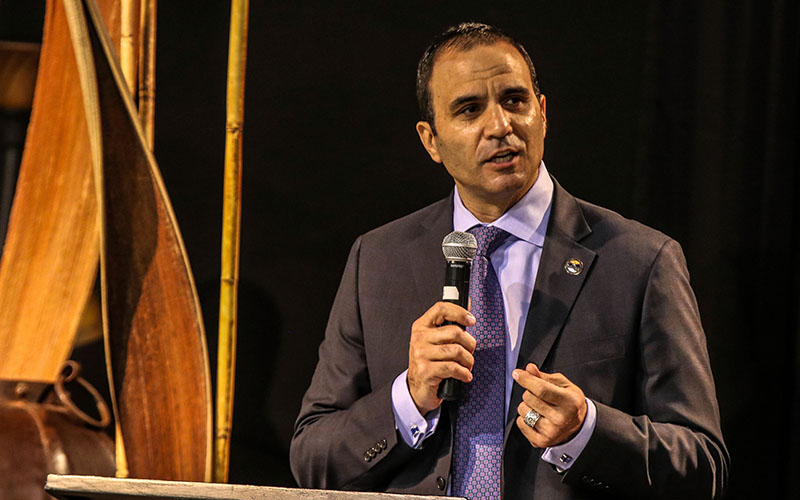PHOENIX – Citing limited resources and Arizona’s controversial history, many local and state law enforcement officials said they have no plans to amp up their immigration enforcement in light of a presidential executive order calling for them to crackdown on illegal immigration.
The executive order, which President Donald Trump signed January 25, in addition to pushing for the immediate planning and construction of a border wall, directed the federal government to “empower State and local law enforcement agencies across the country to perform the functions of an immigration officer,”
Officials from law enforcement agencies across the state were cautious not to elaborate on specific effects of the executive order until the federal government provides more detailed instructions.
“As far as I’m concerned it’s business as usual unless some specific order or mandate comes up that changes the law that makes us immigration officers, and I think we’re a long way from that and that’s something we don’t need,” said Santa Cruz Sheriff Tony Estrada. Santa Cruz County and encompasses 50 miles of the U.S.-Mexico border, including Nogales.
Estrada said his department cooperates with Customs and Border Protection officers and Border Patrol agents, who have a significant presence in his county. He said his deputies call Border Patrol if they have “reason to believe that an individual is in the country illegally.” But he said he simply doesn’t have the resources to enforce immigration law.
Captain Arnold Freeman, a spokesman for the Apache Junction Police Department, said he has similar concerns. Apache Junction’s police force has about 15 officers, comparable size to many smaller cities and towns in the state, but it has the additional challenge of policing a population that doubles in winter months because of visiting “snowbirds.”
“With our current population and what we’ve got we couldn’t take on any additional duties,” Freeman said. “Unfunded mandates kill local budgets, whether it’s coming from the county, the state or the feds, if it’s an unfunded mandate it will literally take away from our local services. If they want us to do it, somebody needs to pay for it.”
Part of Trump’s order calls for a renewed push for 287(g) agreements, which are a provision of the Immigration and Nationality Act that allow the Department of Homeland Security to deputize local and state law enforcement officers to act as federal immigration agents to investigate, apprehend and detain undocumented immigrants.
Seven Arizona law enforcement agencies had active 287(g) agreements in May 2008, according to ICE data, that allowed some departments to check immigration status in their jails and others to have immigration enforcement authority while patrolling the streets. Many of these agreements expired or were scaled back during the Obama Administration, leaving only four agencies in Arizona with active agreements today, according to ICE.
(Graphic by Tynin Fries/Cronkite News)These agencies – Arizona Department of Corrections, Mesa Police, Pinal County Sheriff’s Office and Yavapai County Sheriff’s Office – only have authorization to check immigration status in their detention centers.
Three of the four departments with active agreements said they don’t anticipate expanding their 287(g) capabilities to allow immigration enforcement on the streets.
A spokesperson with the Mesa Police Department declined to be interviewed on the subject and did not respond to emailed follow-up questions by the time of publication.
Chief Deputy Matt Thomas of the Pinal County Sheriff’s Office said his county benefits from the 287(g) program in the jail.
“Rather than cycle people through our jail that are in the country illegally and have committed crimes we cycle them through and once we finish state charges, they are handed off to ICE to face the immigration charges,” he said. “Obviously there’s a lot of emotion around this particular topic but we’re really just trying, at the local level, to do our best for our citizens without infringing on people’s rights.”
The agencies that previously had active 287(g) agreements – Phoenix Police, the Department of Public Safety and Pima County Sheriff’s Department – said they do not have plans to resurrect those agreements after Trump’s order.
“We want crime victims and witnesses to feel comfortable reporting to police regardless of their residential status,” said Sgt. Jonathan Howard, a spokesman for Phoenix Police, in an emailed statement.
Phoenix Mayor Greg Stanton went a step further on Thursday, following large protests opposing the deportation of a Mesa mother who had lived in the U.S. for decades. She was detained Wednesday and deported to Mexico Thursday afternoon.
“Rather than tracking down violent criminal and drug dealers, ICE is spending its energy deporting a woman with two American children who has lived here for more than two decades and poses a threat to nobody,” Stanton said in a statement Thursday. “It is outrageous, and precisely why as long as I am mayor, Phoenix will not participate in the 287(g) program or enter into any other agreements with the Trump Administration that aim to advance his mass deportation plans.”
According to a Pew Research Center report released Thursday, the Phoenix-Mesa-Scottsdale area is home to approximately 250,000 undocumented immigrants, which is tied for the eighth-highest undocumented population in the country when compared to other metropolitan areas.
Alessandra Soler, the executive director of the ACLU Arizona, said Trump’s executive order evokes flashbacks to SB 1070, Arizona’s controversial immigration law.
“It was a dark and awful time for our state and what was so sad about this executive order was it really reminded me of that period in our history in 2010,” she said. “People were afraid and there was so much outrage.”

Police officers at the Law Enforcement Recognition Banquet in Mesa hosted by the East Valley Christian Leaders Alliance. (Photo by Saeed Alshamisi/Cronkite News)
The state law went beyond the 287(g) agreements, which limited the enforcement to criminal task forces and excluded undocumented immigrants who hadn’t committed a crime from being affected. Being in the U.S. illegally is a civil offense.
But SB 1070, even after portions of the law were struck down by the Supreme Court, requires law enforcement making routine traffic stops or arrests to attempt to determine someone’s immigration status if the officer has “reasonable suspicion” that they are undocumented.
The law was embraced by the Maricopa County Sheriff’s Office, which also dedicated extensive resources to 287(g) agreements under the previous sheriff, Joe Arpaio. In October 2016, he was charged with contempt of court after a judge said he intentionally defied orders to stop racially profiling Latinos during traffic stops and workplace raids conducted in search of undocumented employees.
“Arpaio for us, he’s the worst case scenario,” Soler said. “So when you start entering into these types of agreements it opens the door to racial profiling and other illegal practices, like prolonging the time of an arrest just to check someone’s status.”
Arpaio’s successor, Paul Penzone, said in a statement his office would no longer conduct workplace raids, saying the practice was “an exaggeration of law enforcement resources and tactics.” Court monitors have been placed in the sheriff’s office to ensure their practices follow the rules of the court orders Arpaio incurred.
Mark Casey, spokesman for the sheriff’s office said the process for referring undocumented immigrants who are arrested to ICE is “very complex and very cumbersome and very slow which is not a bad thing because it requires us and everyone to deliberate how we’re going about dealing with human beings.”
Penzone’s campaign centered around improving community relations, and Casey said he aims to correct previous wrongs.
“Our predecessor here engaged in wholesale racial profiling in the name of immigration enforcement the was taken to court and was found to be acting in a manner that is outside the law,” Casey said. “No matter where this ends up, we’re going to follow the law and court orders and treat people humanely and with respect no matter what their culture or citizenship status.”
Doris Marie Provine, a professor at Arizona State University’s School of Justice and Social Inquiry, is an expert in immigration enforcement on the state and local levels and published a book in 2016 on the subject, titled “Policing Immigrants: Local Law Enforcement on the Front Lines.”
She said Trump’s executive order likely won’t have far-reaching effects in Arizona.
“I think these orders are incomplete and they’re more limited than the administration is really letting on,” she said. “The other reason is because, frankly, we never got that far away from the policies he’s trying to reinstate in the first place. … Police departments never really did give those programs up. Still, over half of the people that they report to immigration authorities have no criminal history at all.”
Provine also said the order could create potential liability issues for Arizona law enforcement, which is why many departments don’t have an official policy on immigration enforcement.
“We found that over half of places didn’t have either written or an unwritten policy, and since 98 percent have an anti-racial profiling policy… Why would they not have a policy about how to handle the cases where there might be an immigration issue? And the reason is because it’s a total hot potato,” she said. “They don’t want to write anything down.”
